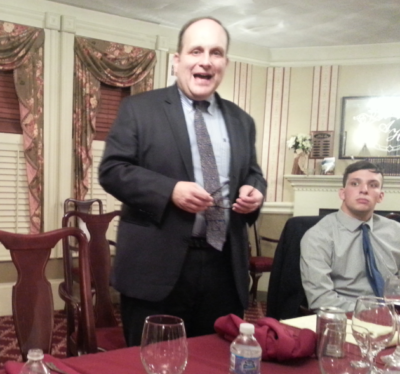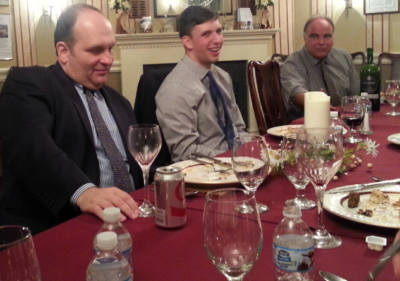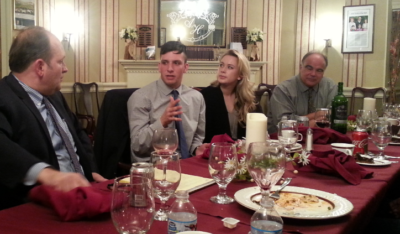On Thursday evening, October 19, Undergraduate Fellows of the Alexander Hamilton Institute for the Study of Western Civilization (AHI) were treated to a Leadership Dinner with John Vecchione, President and CEO of Cause of Action Institute. Like AHI, Cause of Action Institute is a 501(c)3 non-profit organization. Its mission centers on governmental oversight and the promotion of “economic freedom and individual opportunity . . . by honest, accountable, and limited government.” Mr. Vecchione, a 1986 graduate of Hamilton College, also serves on AHI’s Legal Advisory Board. He earned his J.D. cum laude from Georgetown University in 1989 and before leading Cause of Action, worked as a trial attorney. He has argued cases in federal courts at all levels, from appellate to the Supreme Court.
The event began with an hour-long reception, followed by a catered dinner. AHI Executive Director Robert Paquette opened the formal part of the Leadership Dinner by describing it as an opportunity for students, faculty, and informed citizens to gather together and have an “Oakeshottian conversation” (after the British philosopher Michael Oakeshott), one that begins by framing a significant issue and then expands and ramifies as far as the participants’ curiosity and knowledge take them. The purpose is to have a “healthy, deep, and civil exchange of views.”
The evening’s conversation did indeed range broadly, from specific advice for preparing for law school; to national cases involving Hillary Clinton’s email server scandal; to the IRS targeting of conservative nonprofits; to the changes in the practice of law through history; to retrieving records from limestone caves in Pennsylvania, Indiana Jones style, in days of old; to movies that lawyers love to watch. Laughter and probing questions from students punctuated the conversation throughout.
Vecchione began by recalling his years at Hamilton College. While they occurred long before the AHI was founded in 2007, he did have the advantage of being mentored in politics by AHI senior fellow Ted Eismeier, now an emeritus professor, and in economics by AHI charter fellow James Bradfield, also now an emeritus professor. Vecchione noted that Oakeshott believed in the primacy of culture over law. He recalled fond memories of the former Alexander Hamilton Inn, now the headquarters for AHI. He referred to the mansion under AHI auspices as the “Gibraltar of traditional American values.”
A dedicated supporter of AHI since its founding, Vecchione is licensed to practice in New York, Virginia, and the District of Columbia. At one time, he clerked for Judge Joseph Wopner of the television series The People’s Court for three weeks, a fact which, he pointed out, never ceases to draw questions during job interviews and from his lawyerly colleagues. Vecchione recalled some high points of his career. Although Judicial Watch had been first to file in former Secretary of State Hillary’s Clinton’s email case (involving the illegal use of a private email account and server for government business), Vecchione had been first to argue the case. The “real point” of the Federal Records Act, he explained, is to ensure that researchers can have access to governmental activity. “No one,” he underscored, “should be allowed to walk out with the records related to his or her government job.” He also related the findings in Cause of Action’s report on the IRS case of targeting applications for nonprofit status from conservative groups. The fault lay in an internal IRS rule that singles out applications from groups that might garner attention from the media or Congress. Tea party groups were very much in the news after 2009. The AHI also fell onto Lois Lerner’s hit list, and Vecchione was probably the first person to notice it and inform AHI leaders.
The changes in the practice of law, the different kinds of practice (working for “Big Law” firms or doing trial law), and how to get into law school (and which ones) were topics that captivated the audience, especially those undergraduates contemplating a career in law. Vecchione discussed the characteristics of various law schools, strategies for applying (the increasing use of the GRE, grade point averages vs. LSAT scores), how to do well on LSAT, and the role of the lawyer in American society from the time of John Quincy Adams to Teddy Roosevelt to today. He noted that while lawyers dominated as elected political leaders during the founding, they are diminishing in number in terms of percentage of those holding elected office. Voters today prefer military veterans and business people.
Vecchione described the different kinds of legal practice. There is still a need for lawyers who are “from a place” and specializing in a local practice and who know the judges; in fact, that is the primary source of candidates for state legislatures. The Department of Justice, he observed, is a great place to begin a career in law. The entry way for those interested in Constitutional law is getting “narrower and narrower” with only those at the top of their class admitted. He recommended that those interested in Constitutional law clerk for an appellate court judge and especially a Supreme Court judge. He contrasted the practice of jurisprudence with the very demanding and “contentious” work of a trial attorney. Trial attorneys tend to be men with few personal attachments. “Very few [male] trial lawyers,” he noted “are married to their first wives.” To be a public defender one’s “spiritual armor has to be tough.” Vecchione also described the changes in the legal profession arising from technological and social changes. The cases where the board and president might decide on hiring the “best and the most expensive” are becoming fewer and fewer. Even large companies will now ask for concessions.
Technology is changing legal practice. Most filing is now done electronically, eliminating the need for low-level employees to travel to court. The last hold-out, the Supreme Court, is also in the process of making the switch. Vecchione recalled the days when limestone caves in Pennsylvania were used to store records and his visit to one with a host of assistants as he was working on a case for CMT (Country Music Television). Technology has also resulted in longer opinions with many more footnotes. There is less need for physical labor, for fewer “worker bees” in preparing for complicated legal proceedings.
Law schools are increasingly “nervous” because of the diminishing number and quality of applicants. The prospect of paying off huge debt accumulated while in law school deters applicants. Law schools also compete with programs in finance, medicine, and technology for top students. As a result, many law schools are now accepting GRE’s in order to expand the pool of applicants. Most law schools, however, continue to prefer LSAT scores because GRE, according to Vecchione, tends to draw people who may not really want to be attorneys.
In his opening remarks, Vecchione discussed some famous alumni of Hamilton who became lawyers: 1912 Nobel Peace Prize winner Elihu Root; Mary Bonauto, one of the three attorneys who argued the Obergefell case before the Supreme Court; and Marc Elias, AHI academic advisor, who was mentored by AHI Senior Fellow Ted Eismeier. Elias represented Al Franken in the Minnesota senatorial recount and is responsible for opening a new field of election law. The evening’s conversation even shifted to the subject of movies that attorneys like to watch. Vecchione mentioned The Paper Chase, The Verdict, and A Few Good Men.
Since Vecchione interviews prospective students for Georgetown Law, he gave students detailed advice about how to prepare for law school and which laws schools have what characteristics. For those not thinking of law school, the conversation offered an informative discussion of the philosophy, history, and practice of law. It might also have inspired those not considering a legal career to reconsider one. Vecchione noted the disadvantages for conservative students. Yet although the elite law schools still trend overwhelmingly liberal, he added, law schools do allow opportunities for real debate. When going before the court,” said Vecchione, “one can’t “just insist on being right” because of his progressive views.
By Mary Grabar, AHI Resident Fellow




Leave A Comment